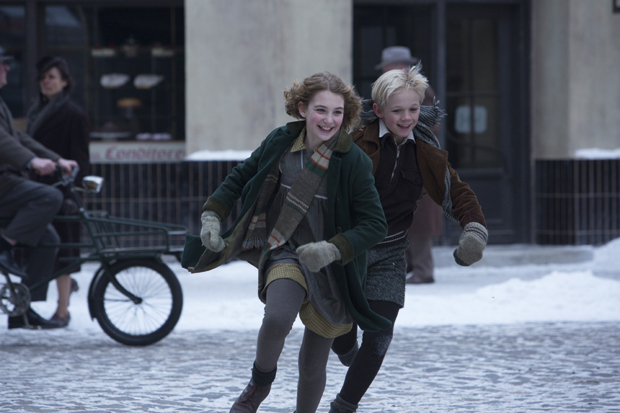The Book Thief is based on Markus Zusak’s novel of the same name which, although written for young adults, appears beloved by many, judging from the readers’ reviews on the internet, and the frequent declarations of ‘it’s the best book I’ve ever read!’, and there is our first worrying clue, right there. Over the years, of which there have been more than enough — I am quite ready to shuffle off now — I have come to learn that when anyone declares a book ‘the best book I have ever read!’ it tends to be the only book they have ever read. If you remain unconvinced, I feel I need only refer you to Paulo Coelho’s The Alchemist, which is basically ‘the best book I’ve ever read’ to the moon and back, even though it is such badly written trash.
So, anyway, they have made a film of ‘the best book I’ve ever read!’, which I haven’t read — after The Alchemist, I gave up on any best books that anyone had ever read — so I can’t tell you what this is like as an adaptation, but can tell you it’s not much of a film, and incredibly irritating. It’s set in Germany, from 1938 until the end of the war, and if forced to describe it in one sentence I would probably go with: a Ladybird primer on Nazism and the holocaust as presented in a pretty snow-globe. And if forced to describe it in one sentence as a Jew, I would probably go with: it’s so hell-bent on being inoffensive it is almost offensive. It steadfastly sidesteps any actual suffering and, instead, offers up a sentimental, treacly affair that wishes only to pull on your heart-strings, if they can be pulled. In this instance, I am quite proud to say, my heart-strings would not be pulled, and actually retracted. (I think I even heard them twang.)
Our heroine is a young girl, Liesel (Sophie Nélisse), who is 11 years old at the outset and whose mother, a communist threatened by the rise of Nazism, allows her daughter to be adopted by a German couple: Hans (Geoffrey Rush) and Rosa (Emily Watson). Hans is kindly and loving and teaches Liesel how to read, while Rosa is initially ill-tempered and spits ‘she’s filthy!’ when Liesel first arrives, even though Liesel isn’t at all. If anything, Liesel looks as if she’s just stepped out of a Pears soap ad. You’d think the director, Brian Percival, could have at least managed to smudge a bit of dirt on her nose, so what was being said would not contradict what we could see with our own eyes, but no. Everything has to be photogenic. Even the Swastika flags that go up around the village look Daz-tastic and freshly pressed.
There are glimpses of Jews being hounded and rounded up, as the Nazis become more visible, breaking store-front windows and burning books, but these only serve as background to the events in Liesel’s life; a life comprised of a series of heart-warming episodes, as snow gently falls. There is her growing friendship with the supremely Aryan-looking but right-thinking boy next door, and her growing friendship with Max (Ben Schnetzer), the young Jewish man whom the family hide in their basement, and who is supremely handsome, but still appears to have had his lashes thickened with mascara. Liesel steals books for Max from the Bürgermeister’s house, while he encourages her to write — ‘If your eyes could speak, what would they say?’ — but if The Book Thief is, at heart, about the saving power of the written word, whom are such words saving here? No Jew, as far as I could see.
There are other miss-steps. German-accented English is spoken along with random subtitles, and that’s just one of the language inconsistencies. (Songs are in German, for example, but books are in English.) Rosa is always complaining about how little they have to eat but no one appears hungry. Buildings destroyed by bombs produce unmutilated corpses. But, worst of all, there is a narrator, as voiced by Roger Allam, and this narrator is Death. I have always hoped Death would be a little bit exciting, somehow, and that when I do shuffle off, we’ll high-five and do drinks, but this Death speaks from beyond the clouds as if banalities are profundities — ‘Despite every effort, no one lives for ever’ — and is a trying bore. I might as well live, as they say.
And what is The Book Thief saying? Unknown. I can’t even tell you what its intentions are, or whom it is intended for, only that it lacks even a whiff of emotional heft. I also learned nothing from it although have, at least, taught you something, and that is: if anyone ever comes at you with ‘the best book I’ve ever read!’, run a mile.
Got something to add? Join the discussion and comment below.
Get 10 issues for just $10
Subscribe to The Spectator Australia today for the next 10 magazine issues, plus full online access, for just $10.
You might disagree with half of it, but you’ll enjoy reading all of it. Try your first month for free, then just $2 a week for the remainder of your first year.














Comments
Don't miss out
Join the conversation with other Spectator Australia readers. Subscribe to leave a comment.
SUBSCRIBEAlready a subscriber? Log in